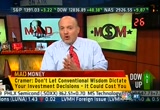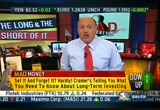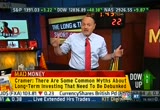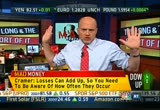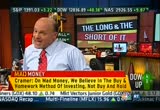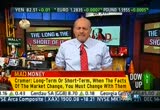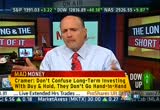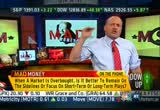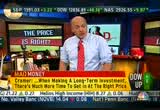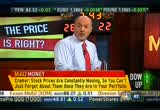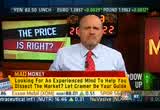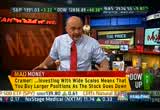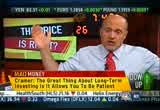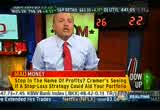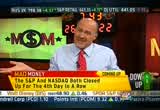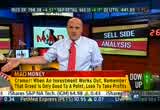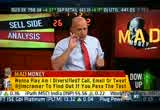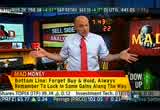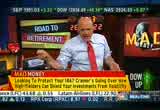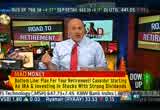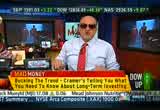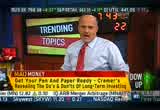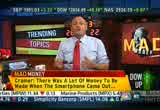tv Mad Money CNBC November 21, 2012 6:00pm-7:00pm EST
6:00 pm
i'm melissa lee. have a great thanksgiving, a safe one. "mad money" starts right now. . >> happy turkey day. ♪ i'm jim cramer and welcome to my world. you need to get in the game. firms are going to go out of business, and he is nuts! they're nuts! they know nothing. i always like to say there is a bull market somewhere. "mad money," you can't afford to miss it. hey, i'm cramer. welcome to "mad money." welcome to cramerica. other people want to make friends. i'm just trying to save you some money. my job is not just to entertain you, but i'm trying to teach and coach you. so call me at 1-800-743-cnbc. in recent years, stocks have become more hated, hated than any time i can remember my entire career. it spans a lot of time. but you know what? i still believe anyone can turn a profit in the stock market, as long as you're willing to put in the time and the effort to keep track of what you own. i wouldn't come out here every night to try to educate you if i
6:01 pm
didn't think it was not just theoretically possible, but actually feasible for the vast majority of people to succeed at managing their own money. okay. so if that's the case, then why is investing so darn difficult? how come so many people struggle to make money in the stock market? how the heck can i believe it's possible for you to beat the averages, the big benchmarks like the s&p 500 and the dow jones industrial average when so millennium -- and mutual fund managers fail to do so. simple. you can do it. but you have to do it the right way. one of the biggest obstacles to successful investing is a lack of clarity about just what investing is supposed to mean. i have seen countless people try to follow the conventional wisdom about money management only to have their investments wiped out because the conventional wisdom is wrong. and the worst part is those people had no idea they were making a mistake. they thought they were being
6:02 pm
responsible. in other words, to borrow a phrase from "cool hand luke" -- >> what we've got here is failure to communicate. >> i'm shaking it, boss. that's why tonight i want to demystify the concept of long-term investing, an idea that has been misinterpreted so often in so many ways that it's become more of a hindrance than a help for most of us. so listen up, tonight setting you straight. here on "mad money" we're about long-term investing, often mischaracterized. there is a serious problem with this notion. it goes like this. too often people let the concept of long-term investing get in the way of investing. if you think long-term investing is about making boatloads of money over years, decade, each lifetimes, i'm on board, and that's something i can teach you how to do using the disciplines that allowed me to make fortunes for my already rich partners back in my old hedge fund where i ran a million dollars. however, i've seen people in long-term investing as an
6:03 pm
excuse, an alibi either for poor performance -- >> the house of pain! >> -- or for not paying attention to what they own. you often hear that you shouldn't worry about your losses or the profits that you're missing in the present, that it's okay to take short-term pain because you'll make back the money you're losing with long-term gains. sometimes absolutely true. but most of the time losing money month after month after month or year after year, that santa good recipe for making money over the longer term horizon. but a bunch of short-term losses don't magically turn into long-term gains if you just wait long enough. simmer and boil here. yes, making money over the long haul is the ultimate goal in this game. but it's also become the ultimate excuse, the alibi for short-term losses. and believe me, that kind of thinking will only make you a worse investor, not a better one. so before i can teach you how to invest for the long-term, i have to disabuse you of all the long-term alibis that you've been fed for ages and still are today. so where do these sirens of long-term investing lead you astray? at what points do you need to
6:04 pm
cover your ears and tie yourself to the mast a la odysseus so you don't end up steering your portfolio on to the rocks? first and most important, long-term investing is not the same as simply owning stocks for a long time. in other words, don't confuse being a good invest were the idiotic ideology of buy and hold, or as i skeptically dub it, buy and forget. buy and hold has been the conventional wisdom for decades. it still is. this one bad idea has lost more people money than the last two crises combined. just because you have a long-term horizon, that doesn't mean you afford to take loss after loss after loss in the short-term. and just because those losses are unrealized, believe me, that doesn't make them into gainers or potential gainers. losses are losses, realized or otherwise. and the notion of being in something for the long-term doesn't justify owning damaged goods. the stocks of companies that are in bad shape in the misguided hope that they'll eventually recover, hey, damaged goods. the idea behind buy and hold,
6:05 pm
once you purchase your stock, you just wait. me, i've never liked waiting, and it also happens to be a terrible strategy. that's why i'm constantly saying you always have to keep track of your investments. you have to do that ridiculous hard, i know, time consuming homework that isn't ridiculous and is not that hard and it's not that time consuming. but it's what i tell you all the time. go over the quarterly reports, read the s.e.c. filings, reading transcripts, fine, a little faster sometimes. much of the research that used to be available, only paying millions of commissions, now found on the web, cnbc, the street, they all got it. it's worth your read together. it's your money. please invest the time in it. the advocates of buy and hold act like investing for the long-term means you have a license not to pay attention to the short-term. it's like you have a birthright. i can buy a stock, and that allows me to not do homework. you always have to pay attention. the moment you stop is the moment you will start losing money. that's why people underperform. you will never be able to recover from the losses until you get engaged with your portfolio again.
6:06 pm
you're not stupid. you can get engaged and you can do this. now sometimes companies go into what is known as secular decline, and their stocks never really recover. in that case, you can't afford to wait for a turnaround. you just have to get out before the damage becomes too horrific. yes, polaroid, kodak, okay. research in motion, nokia. how about radioshack, right? radioshack, that was a good one. or supervalu. all the way down we were told that long-term you're fine. or in other words, being a long-term investor doesn't give you a license to be a lazy and apathetic investor. as anyone who owns stocks through the misery and horror of the crash in 2008 and the beginning of 2009 knows it doesn't work. investing for the long-term does not mean owning stockses forever. if one thing the crash did, it disabused people that you can hold stocks for eternity and somehow magically bank of america comes back to 50. as long as you don't pay attention too hard, i get it. still, from the stories i read and from pundits, the lessons
6:07 pm
are already being forgotten. and i can't have that happen, not on my "mad money" watch. i've always been one of the loudest opponents of buy and hold. in this brave you world of euro meltdowns, men who espouse this philosophy have tried to change their tune or they've been discredited that no one listens to them anywhere. it doesn't mean you should write off the idea of long-term investing too. it doesn't mean stocks can't make you money over an extended period of time, although that's what many of might think if you confuse long-term investing with buy and hold investing. buy and hold was always bogus. but the truth is stocks are still the best way to make money for your retirement, 529 plan to send your kids to college or to save up for big ticket items like a house, a car, vacation. allow you to compound your wealth by reinvesting, the kind of dividend payers that i highlight in "getting back to even." you'll never get any of those things if you use an excuse or alibi for poor performance. sometimes something you won't
6:08 pm
even know about if you just buy and forget, because you feel it's a license not to have to find out about. here is the bottom line. long-term investing has gotten mixed up with a lot of bad ideas over the years, but that doesn't mean that it's impossible or it's not worth trying. i can teach you the disciplines and strategies that will allow you to build long-term wealth by investing in stock, just as long as you remember by saying hey, come only, i'm a long-term investor is no excuse for not doing the homework or following the rules. if anything, being in stocks for the long-term requires more diligence and more patience than if you're in there for the short-term. so don't throw away all the lessons that i teach you. you're going to need them. to paraphrase that fabulous poetic amateur investor and world renowned beauty gertrude stein, a loss is a loss is a loss, unrealized or otherwise, and don't you forget it. bill in florida, bill? >> caller: hey, yes, jim. nice to talk to you. >> same. >> caller: hey, jim, i'm a retiree, and i'm on a fixed income. i'm very concerned about the future. so much uncertainty, jim,
6:09 pm
uncertain in taxes, uncertain in the elections. >> right. >> caller: and inflation is a big concern of mine. is there anything i can do at my age to protect myself from all these uncertainties that are coming up? >> okay, well, look. i've got to tell you unless you have -- you're a person who really does have to heed my 20% in gld or gold, gold bullion. i'm not going to tell you listen, you should buy bonds that yield 2% and that's going to protect you. i think gold is going to be the best defense you have against the worries that you just outlined. let's go to anthony in virginia, please. anthony? >> caller: washington redskins boo-yah rg3 nation stand up. >> man. dan snyder is your owner, have you thought about that at all? >> caller: i got a quick question. >> boo! >> when stay on the sidelines or look to get in long-term? >> when it's overbought, my old rule, i use the s&p oscillator. it comes delivered to my door on
6:10 pm
saturdays. my rule is very overbought, hey, take a pass. another time will come. however, you can get started small and hope it comes back if you just can't resist. sam in ohio, sam? >> caller: hey, jim, big glass city boo-yah to ya. >> love it. what's up? >> caller: i have a question. i've been looking at a couple of utility stocks, and looking at either going with preferred instead of the common shares. i just wanted to get your opinion on maybe what might be better -- >> nah, come on, we want upside. we want upside. we don't want to cap our upside. you know what? let's just own them outright. we'll do just fine. of course i want you in this market for the long run. the whole idea of trading back, you can't beat the high frequency traders. give me a break. i want long-term investing. but that does not mean buy and forget. even when you intend to hold on to a stock, promise me for the long haul, do not throw out the rules. keep doing the homework. be sure that you're in the right
6:11 pm
merchandise, and stay with cramer. it's a brutal full contact sport. >> from the time the whistle blows -- >> traders bracing for what could turn out to be a wild session. >> to the last play of the game. >> markets absolutely getting hammered today. >> i know it's not easy, but i promise to keep fighting for you. >> jim cramer, leveling the playing field for all. >> the road is a tough one, but the payoff can be your greatest win of all. >> join "mad money's" training camp week nights. >> don't miss a second of "mad money." follow @jimcramer on twitter. have a question? tweet jim cramer, hatch tagg madtweets. send jim an e-mail at madmoney@cnbc.com. or give us a call at 1-800-743-cnbc. miss something? head to madmoney.19.com.
6:12 pm
6:13 pm
in advanced teacher education. let's build a strong foundation. let's invest in our teachers so they can inspire our students. let's solve this. thor gets great rewards for his small business! your boa! [ garth ] thor's small business earns double miles on every purchase, every day! ahh, the new fabrics. put it on my spark card. ow. [ garth ] why settle for less? the spiked heels are working. wait! [ garth ] great businesses deserve great rewards. [ male announcer ] the spark business card from capital one. choose unlimited rewards with double miles or 2% cash back on every purchase, every day! what's in your wallet? [ cheers and applause ]
6:14 pm
what's in your wallet? get 36 months interest-free financing through thanksgiving weekend at sleep train, and save $400, $500, up to $600 on beautyrest and posturepedic. even get 3 years interest-free financing on serta icomfort and tempur-pedic. plus, free same day delivery, set-up, and removal of your old set. when brands compete, you save. but mattress price wars ends sunday, thanksgiving weekend, at sleep train. ♪ sleep train ♪ your ticket to a better night's sleep ♪ let's talk the price is right. no, not the game show, i'm
6:15 pm
talking about the stocks. if you want to actually make money from your stocks, then it's absolutely critical that you buy them at the right price. that's true whether you're making a short-term trade or purchasing something that if everything goes right, you expect to hold for years and years and years. the price still matters. when you pay too much for a stock, you make it vastly more difficult to rack up the big gains, the kind that you and i want. if you get the price wrong, you might not make any money at all. i think price is dramatically underrated as a determinant of successful investing, which is why tonight i'm giving the power of price its due. so how do you find the best price to pull the trigger, given how important i think it is? when you're investing for the long haul, you have one huge advantage over people who are using a shorter term horizon. a resource that traders simply don't have the luxury of exploiting. i'm talking about time. as a longer term investor, you have all the time in the world. now when you want to buy a stock because you like the underlying company's prospects and when there are no near-term catalysts
6:16 pm
that can drive the share price up any time soon, well, that's a recipe for being patient. you don't have to pay the price the market is giving you right at that very moment, right? you can be patient and wait for the stock to come down to your price before you do this. of course, you're never going to get an all clear signal telling you it's time to buy. you're not going to hear this and say i know. how exactly are you supposed to know how long you should wait before you pull that trigger? simple. don't know this. is one of the areas where you have to embrace the facts of ignorance. that's why i tell you to buy your stock in increments. loading up gently and over time because we're all ignorant in the end. well don't know when a stock or the market is going to give us a the ideal time. let's bet that we get the wrong one first. if you buy all one level and the stock goes down even further? you know what's going to happen? you're going to feel like an idiot. and then you'll dump the whole position, instead of using the weakness to buy more. i studied thousands of trades. this is one of the most common problems i saw there is no right
6:17 pm
price, but if you patiently pick up shares over weeks and months, you can avoid paying the wrong price. and that's more important. that's why back at my old hedge fund and currently for my charitable trust, you can follow along, action alerts plus, i like to buy with wide scales on the way down. buying with wide scales on the way down describes the way you should purchase a declining stock or stock that you're afraid is going to go down because of the stock market in general while it approaches the bottom. you want the get the right entry point for your long-term investment, and that is the way to do it without getting discouraged. i'm trying to stop human nature here. it's practically impossible to call perfect bottom. i've rarely ever seen it. that's why we don't try to time too bottom. the otds of being wrong are too high. the way the pros do it and the way you should do it is to buy incrementally on the way down, and the big guys do this, believe me. it's your insurance against potential bad judgment of you know the stock is going down and
6:18 pm
you want to be all-in because you're so darn sure that you're getting in on the ground floor. in you have to assume there is a basement, if not several subbasements. this notion of scaling into a position is a trick that helps you around the difficulty of timing the market correctly. it is a trick. it's just something that i've used over time that has given me better prices. so let's say you want to buy 400 shares of caterpillar. say it's trading at 90. you buy all 400 and then it trades down to 85. you know what? you're going to feel like a stooge. the dreaded schepp. and you'll lost two grand in the blink of an eye. that's why we don't do that. the cramerica approach start small. you wait for a pullback. you wait for the market to bring it down or cat to come down. if it come downs to 85, rather than contemplating suicide, you're thrilled to have a better entry point where you can buy another 100 shares came to you at a lower price. you buy the next 100 shares. if cat drops to 81 and you put on the final hundred.
6:19 pm
if the stock sinks below 80 you have a pretty good basis. basis matters. basis is price. the worst case scenario, caterpillar goes higher after the first 100, and you make a little money, even if you don't have as many shares as you wanted. now that's what i call a high quality problem. to sell a stock, you should unload incrementally into strength. oh, boy, i sold it all and then it had a big move. eliminate that thinking. you know about buying incrementally. now let's talk about scales. if you're buying a stock that is sinking a little bit lower every day, and that's okay, because the company could be good, you can either buy it with strict scales or wide scales. what is the difference? let's stick with caterpillar as our example. if you're using strict scales you would buy say a thousand shares every time the stock loses a point. each time the stock goes lower you buy. that's the way institutions trade. every time cat goes down a point or three points or whatever size decline makes sense, you purchase the same amount of stock. using strict scales is mart and responsible. i sometimes have a problem with it. and that's why i like to use
6:20 pm
scales. the trick with wide scales is you buy larger and larger positions as the stock goes lower. i used to think of it as a pyramid of buying. if the stock lost a point, i would put on a thousand points. another point, 1500. and when it is so low you can hardly believe how poorly the stock is trading, you can double down. do you see what i mean? it's about a pyramid structure. the best investors all use pyramid style. they just don't talk about it. the great thing about wide scales is they leave you with lots of room to maneuver. when the stock eventually bottoms out, you're going to want to pour your money in and using wide scales allows you to buy the largest number of shares at the lowest price. the best thing about long-term investing is you can afford to be patient. you can wait for a market wide pullback or a sector wide sell-off to accumulate a big position in the company's stock as it goes down. just make sure the story is still intact. that's why i say you got to do the homework. if the underlying company is broken, it's never going to be a bottom, no matter how far it
6:21 pm
falls. in that case you might need to abandon ship and find a better one to travel on. there is no sin in recognizing you made a mistake and you have the wrong stock. the bottom line, in this game, few things are more important than price, trying to get a good basis. as a long-term investor, you have the luxury of being able to wait for a good one. keep patient. wait for the right pitch. and never buy all at once. and when you're trying to catch a stock on the way down, be sure and buy it with wider scales to get the best possible overall basis. joe in massachusetts, joe? >> caller: hey, boo-yah, jim. i've got a quick question for you on stop loss orders. versus stop limits and how an individual investor can best use that. not only to minimize losses, but to ride the ups and downs of an individual stock. >> well, look. i don't condone these. if you're going to own stocks and you're going to try to get the right prices, you got to stay on top of it. i'm sorry. it's too important. it's your money. you get one of these flash crashes, suddenly you bought a
6:22 pm
stock at 80, it's at 70 immediately, i can't condition doan that because the market doesn't work well enough to do those things anymore. it's too crazed. you have to protect yourself from this market. from any market that acts badly and strangely. because of high frequency trading, those old tricks out the window. price matters. basis matters. don't buy all at once. don't sell all at once. keep an open mind. keep doing the homework, and stay with cramer. jim cramer, looking out for you. >> thank you, sir, for helping us average joes on the road to financial freedom. >> thanks for all you do for us small investors. >> thank you for helping all of us home gamers. >> think thank you for sharing your knowledge with the every man. >> i love doing it for you. any time anyone says thank you, it's great. >> anywhere, any time, any place. answering the call of cramerica, 6:00 and 11:00 eastern on cnbc.
6:23 pm
[ male announcer ] this december, remember -- what starts with adding a friend... ♪ ♪ ...could end with adding a close friend. ♪ the lexus december to remember sales event is on, offering some of our best values of the year. this is the pursuit of perfection. i heard you guys can ship ground for less than the ups store. that's right. i've learned the only way to get a holiday deal is to camp out. you know we've been open all night.
6:24 pm
is this a trick to get my spot? [ male announcer ] break from the holiday stress. save on groushipping at fedex office. you won't just find us online, you'll also find us in person, with dedicated support teams at over 500 branches nationwide. so when you call or visit, you can ask for a name you know. because personal service starts with a real person. [ rodger ] at scottrade, seven dollar trades are just the start. our support teams are nearby, ready to help. it's no wonder so many investors are saying... [ all ] i'm with scottrade.
6:25 pm
the only way to generate consistently strong returns year after year after year is by putting some thought and some effort into the process. anyone who says you can make money in stocks without keeping track of short-term developments at the underlying companies is like a personal trainer that promisious can get in shape without doing any exercise. here is a pill, okay? it doesn't work. yet i think a substantial majority of the public still believes this buy and hold nonsense is the only legitimate way to invest. i read about it in the papers all the time. no wonder stocks are so hated. people have been convinced if
6:26 pm
they ply blue chip stocks, as if that term means anything anymore, and they just wait long enough, those stocks will work their way higher because of that some law of reverse gravitation that they all subscribe to. it's been a lousy strategy, if it's been a strategy at all if you can even subscribe to that. in recent years, it's been really horrific. think about it. for the last -- the five years 2007 to the middle of 2012, s&p 500 have climbed by 9%. things have gotten better over the last few years. but when you look at the benchmark performance over the first decade of the new millennium, the s&p was down 24%. though you only did lose 9%, lose only 9 in the ten years when you factor in reinvested dividends. which is why, hey, i'm always telling you to own some high yielding dividend stocks. but still, factoring dividends from 2000 to 2009, you were better off hoed hiding your money in a mattress. the strategy didn't work. let me give you some advice that you almost never hear from any
6:27 pm
fraternal order of buy and hold. i want to talk about a forbidden term. some say it's a curse word, marks me as a charlatan. i want to talk about selling, selling. every a stock you buy you should consider it comes with an expiration date. again, radical. knowing when to sell is every bit as important as knowing when to buy the stock. in fact, it's actually more critical. so many people make such a huge number of selling related mistakes either by panicking and selling in a weakness, or by getting greedy and not selling at all. no one ever talks about selling, except for me. if you pick the right stock, the ones with fabulous long-term stories and eventually you'll have winners that are up and up big. the trick at that point is not to go all in gordon gecko. greed is not good, man, it's dangerous. it's horrible. [ buzzer ] >> boo! >> remember, bulls make money. short sellers are bears can make money. but pigs, slaughtered, bacon.
6:28 pm
when you got a serious winner, even if you think it still has many years of gains left in it, hey, you know what? take some profit, period. no discussion. and you'll be tempted to let your winners ride. you can let some of them ride. but it's a mistake to let them all. you got to ring the register on some, a partial portion of your position, otherwise your win coerce become losers, and that's a huge sin. it's best to lock in profits while you still have them by selling incrementally into strength. believe me, you haven't really won until you have taken something off the table. hey, i'm making a lot of money. don't use that term, making, unless you're profiting. ringing the register. why am i putting so much stress on the need to unload your best performing stocks that we're supposed to let run and never touch? for starters, you don't need me to tell you to sell your losers. maybe the story isn't playing out as well as expected, maybe management isn't executing. maybe economy takes a turn for the worse and suddenly your stock belongs to a sector that is out of favor. don't get sentimental. you got to sell.
6:29 pm
take a small loss and give a broken company a second chance to burn you and then take a much larger loss. lots of people hang on to the losers, often because they're waiting for them to get back to even selling. it's the worst kind of amateur mistake. but even then, these people know their losers deserve to be sold, they want to sell, they're just waiting too long for an unrealistic price that is too high given the downturn with the actual company. selling your losers seems to make perfect sense. selling your winners, though, that's totally counterintuitive for many of you. have to at least trim your biggest gainers. the first reason is simple, diversification. when you let your winners ride, your position can get too big. let's say you own a stock that doubled and doubled and doubled. maybe you bought apple that traded around 200. it represented 15%, it's now a much bigger piece of the pie, even if over stocks you own have gone up decent amount. at that point you have too much exposure to even the single best stock in whatever sector that stock is in.
6:30 pm
you know my rules you. never want to have more than 20% of your portfolio in any individual sector because keeping all your reguleggs in o is downright dopey. you trim your winners. i'm not saying sell them all. that's what it's going to be interpreted is, and it's not true. if you're investing for the long-term, you have time to do this. and you do it gradually, pieces, not all at once. as your winners go higher you should sell out parts of your position, a sellout, never sell all at once, just like you should never buy all at once. try to wait for moments of strength so you can get better prices as it goes up. don't wait too long. you don't want your portfolio to become too heavily weighted toward any one group there is one concept you should be aware of when you sell your best performers. that's the idea of playing with the house's money, which i explain? "staying mad for life." you want to trim your position to the point, this is your ultimate goal, not buy and hold, where all the money you have invested in that stock comes
6:31 pm
from profits you have already made, and not a penny comes from the original investment. once you pare back your winners so that you're playing with the house's money, then, then you can afford to make more risk with what's left. that's the holy grail of investing, because you can't lose. you're in a can't lose position. you can ride it all you want, never let it go. that's fine with me. that you can buy and hold. it's bought and paid for by the house's money. one last thing. younger investors can afford to let their gains run for longer than older investors. why is that? the fact is those of us that are older we don't have time. when it's younger you preserve your capital. you have all those paychecks coming in. those of news the older demographic, even if you're extraordinarily well preserved, like myself, i mean who would guess i'm a limber 60 something, you've got to be more careful that means trimming your winners more aggressively and ringing the register more regularly than a younger investor might. here is the bottom line. when you're investing for the long-term, you can't just hold stocks forever. you have to remember to take
6:32 pm
profits, trim back your winners so that your portfolio stays diversified. and when you can, try to take all of your invested capital out and just play with the house's money. that's my ultimate goal. that's the only time i say you can buy and hold. nick in kansas, nick? >> caller: hey, jim. i was just wondering, should we embrace the increasing popularity of ets as a way to mitigate market volatility? if so, which ones would you recommend? >> the only etf that i would recommend on this show is the gld. and why is that? because that's gold. i want to own the best. etf gives me the opportunity to own the worst with the best. i think one of the things i've learned is be able to pick which ones are better and which are worse. that's what i want you to do too. i can teach you and you can do it too. daniel in texas, daniel? >> caller: baylor bears boo-yah to you. >> man, i always wanted to do the show from baylor. one day. what's up? >> caller: i was in a money
6:33 pm
portfolio management class. and one of our key tools of trade with the peg ratio was to find the most valuable spots in the fund. while specializes in i.t., estarted looking more toward the price, the cash free throw and the free cash flow to find the more valuable i.t. stock. do you think a press cash flow -- >> look, i happen to like the peg ratio, but i look at myself when i'm analyzing company that i want to be involved in and i look at operating cash flow. that's the one thing that no one can really jigger. operating cash flow that is agreeing, to me, and you're a student in business, so you know how to look for it is a great way to measure a company's worth and its future. all right, with apologies to gordon gecko, greed not good. you got to lock in profits as stocks go up. you can't just hold stocks forever, unless you're playing with the house's money. the best position you can be in is when all that's left is the profit that the market has given to you. then you can let it run forever. stay with cramer.
6:34 pm
sitting on the sidelines because of all the uncertainty in the market? >> thanks for turning my portfolio from mean to green. >> that's what i want to hear. >> with over 25 years of experience in bull and bear markets, let coach cramer show you how to play to win. >> thank you for keeping news the game. >> "mad money," week nights on cnbc. try running four.ning a restaurant is hard, fortunately we've got ink. it gives us 5x the rewards on our internet, phone charges and cable, plus at office supply stores. rewards we put right back into our business. this is the only thing we've ever wanted to do
6:35 pm
and ink helps us do it. make your mark with ink from chase. is bigger than we think ... sometimelike the flu.fer from with aches, fever and chills- the flu's a really big deal. so why treat it like it's a little cold? there's something that works differently than over-the-counter remedies. prescription tamiflu attacks the flu virus at its source. so don't wait. call your doctor right away. tamiflu is prescription medicine for treating the flu in adults and children one year and older whose flu symptoms started within the last two days. before taking tamiflu tell your doctor if you're pregnant, nursing. have serious health conditions, or take other medicines. if you develop an allergic reaction, a severe rash, or signs of unusual behavior, stop taking tamiflu and call your doctor immediately. children and adolescents in particular may be at an increased risk of seizures, confusion or abnormal behavior. the most common side effects are mild to moderate nausea and vomiting. the flu comes on fast, so ask your doctor about tamiflu.
6:37 pm
if you want to invest for the long-term, and like it or not, that means planning for your retirement, to misquote john maynard keynes, in the long run, we all retire. i know that may not sound sexy. but trying to put together enough money to become financially independent is really what we do every night on "mad money." you have to contribute to your 401(k) plan if you have one, and you have to contribute to your individual retirement account or ira. that is the conventional wisdom. while it's mostly right, it's not exactly helpful. tonight instead of just telling you to park money in your ira, i'm going to give you suggestions on what stocks to buy with your retirement cash.
6:38 pm
these are both tax blessed vehicles. the money in i.r.a. or 401(k) comes from pretaxing. each better, while your money stays in these accounts, you pay no profit taxes on your profits so, your investments can compound for years tax-free giving you a much larger return over decades and desk cades. you only pay when you withdraw it. it's a sweet deal. they do fluctuate over time. they've gone up and down throughout my trading career. however, as much as i like the tax favored status of 401(k) plans and i.r.a.s, i have to give you some heretical here, something almost nobody lels come out and say. most company's 401(k) plans stink. they've got high management fees in the administrative costs that eat into your returns. worst of all, they typically offer you lousy choices for your investments, not nearly enough control over them. the 401(k) business is to me sometimes a racquet for the managers who get to charge for the large fees.
6:39 pm
i'm very upset about this. ideally when you're managing your own money you want a diversified portfolio of five to ten individual stocks. but you see, most 401(k) plans won't let you do that. often lay they only let you choose from a very limited menu from a couple of dozen different mutual funds. the best you can normally do is find a decent low cost index fund and put your 401(k) money in there. given that the whole premise of "mad money" is so you can do better than an index fund by picking individual stocks and managing your portfolio on your own with your own time frame, that makes a 401(k) a pretty poorly designed vehicle. sometimes it feel likes the whole 401(k) system was set up to benefit the financial services industry, not you. and given the way washington works, it wouldn't surprise me if that was actually the case. nevertheless, as much as most 401(k) plans stink, you should still contribute to your 401(k), even if you put it in cash because then you got to take advantage of the tax blessed nature. these tax-favored vehicles are too good to pass up. plus, many employers will match your 401(k) contributions.
6:40 pm
i'm a big believer in not turn do you think free money. put enough money in your 401(k) to max out the company match, if you have one and then stop. then the rest of your retirement invest shotgun happen in your i.r.a., until you hit the upper limit on what you're allowed to contribute in a given year. unlike most 401(k) plans, an i.r.a. gives you the freedom to invest your money whatever way you want. for 2012 the maximum contribution was $5,000 or $6,000 if you're over the age of 50. what should you buy in your i.r.a.? like i tell you in "getting back to even," your best bet here is to own in of the high yielding stocks that provide protection and generate income there are a couple of wrinkles that make investing in an i.r.a. different. as much as we like high yielders, it doesn't really work well for limited partnerships. kinder morgan partners. which means you don't pay any taxes on them until you sell the stock. love that but there is this arcane tax rule that has been interpreted very toughly by the
6:41 pm
irs. if you buy too many of the stocks within a retirement account, you pay the irs taxes that you wouldn't have paid if you bought them in a regular brokerage account. same hit you with real estate investment trusts. reits do tend to have high yields. you got to be careful of the mortgage reetz. what i tell you, that's the group you want, but you have to tax your tax professional about mlps and real estate investment trusts before you choose them otherwise go with the plain utilities and higher yielding telcos. beyond that, use the same metrics. looking for high yields. dividends has to be safe. the company better have enough earnings to cover the payout. we like companies with a consistent record of raising their dividends. that's great for capital gains that are tax-protected. the bottom line, a huge part of long-term investing is retirement investing. and the best way to prepare for your retirement is putting money in a tax favored vehicle like an i.r.a. and investing it in high yielding dividend stocks. the gel is to reinvest your
6:42 pm
dividends and let them compound year after year after year without paying any taxes until you withdraw your money at the very end. that's a terrific recipe for producing huge long-term returns. david in california, david? >> caller: hi, jim. like your show. >> thank you, david. thank you for calling in. >> caller: you frequently comment about make listening to conference calls. you're probably at the institutional level. can the ordinary individual gain access even in the listen only so they can listen to the analyst questions as well as management's response? >> a lot of times they'll let you do that. but it doesn't matter. you don't need it in realtime. you can go get the transcript. that's the way i do it. sometimes i like to do it in realtime, but i do the transcript on the way home. go over the transcript at night. and the transcripts are readily available everywhere. you can stop -- that's the important thing -- you stop and think. you can't do that when you're listening to it live. long-term investing involves not only an ira, but knowing which
6:43 pm
ones to put in. reinvest, build up over time. avoid the taxes by simply making sure you make the contributions every year. stick with cramer. taking control of your financial destiny is smart. but why would you go it alone? >> something that has a much larger bearing on you in the stock market as a whole. >> let cramer be your guide, your sounding board. >> i'm having a hard time with my favorite stock. >> i know you can beat these professionals. >> and your coach on the road to financial independence. "mad money," week nights on cnbc. n and jeremiah. they don't know it yet, but they're gonna fall in love, get married, have a couple of kids, [ children laughing ] move to the country, and live a long, happy life together where they almost never fight about money. [ dog barks ] because right after they get married, they'll find some retirement people who are paid on salary, not commission. they'll get straightforward guidance and be able to focus on other things, like each other, which isn't rocket science. it's just common sense. from td ameritrade.
6:44 pm
i am probably going to the gas station about once a month. last time i was at a gas station was about...i would say... two months ago. i very rarely put gas in my chevy volt. i go to the gas station such a small amount that i forget how to put gas in my car. [ male announcer ] and it's not just these owners giving the volt high praise. volt received the j.d. power and associates appeal award two years in a row. ♪ with the spark miles card from capital one,
6:45 pm
thor gets great rewards for his small business! your boa! [ garth ] thor's small business earns double miles on every purchase, every day! ahh, the new fabrics. put it on my spark card. ow. [ garth ] why settle for less? the spiked heels are working. wait! [ garth ] great businesses deserve great rewards. [ male announcer ] the spark business card from capital one. choose unlimited rewards with double miles or 2% cash back on every purchase, every day! what's in your wallet? [ cheers and applause ]
6:46 pm
here is a serious conundrum. how on earth are you supposed to pick stocks for the long haul when sectors are constantly going in and out of style on the wall street fashion show? when that's not the way this game has started to work anymore? there are very few stocks you can keep on riding higher and higher, year after year. but when you find them, they're the holy grail of investing. and those don't go in and out of vogue, to stick with the fashion show analogy. all right.
6:47 pm
like i told you before, there is no such thing as a stock you can own forever. that's the essence of the kind of buy and hold thinking that has lost so many people such huge sums of money over the years. but some winners are more lasting than others. and there is a certain type of stock that can produce incredible multi-year gains, and they can be owned for much longer than what i regard as ordinary stocks. i'm talking what is known as secular growth stocks. that's a rare breed that you should always be on the lookout for. these companies are driven by powerful long-term stories that transcend the strength or weakness of the underlying economy. most companies need a healthy economy in order to thrive. we call that cyclical growth. but a true secular growth story can deliver fantastic numbers, even in a lousy economy. numbers so consistently good that they can keep powering the stock higher, quarter after quarter after quarter, year after year after year, regardless of the economic environment. how do you spot a genuine secular growth name? i like to look for big picture
6:48 pm
themes. we have a company that is playing a much broader trend. take the healthy eating in the country and the embrace of the natural and organic foods. this has made whole foods into a powerhouse stock. of course, it's also destroyed the regular supermarkets. and the same for hain celestial, which makes many of the products found in whole foods, it's not your average consumer packaged goods company, huh-uh. even secular growth trends in the end have a limited shelf life. and what you see as these themes age that there are fewer and fewer plays that can consistently make you money. last longer, but never just last forever. years ago, back when the smartphone was a relatively recent invention, most people were using dumb phones, i started talking about the power of the mobile internet tsunami. and for a while, boy, there was a ton of money to be made over the smartphone food chain as people converted from dumb phones to smartphones. but really, the tsunami turned out to be the best of breed players like apple, which never stopped being a best performer.
6:49 pm
weakest players gradually fell by the wayside as we learned. a rising tide does not lift all ships. the ones with holes in them still sink, even with great secular trends. here is the bottom line. most of the time you can just hang on the a stock for years and years. but if you have i find a secular growth story, something driven by the same chiend of theme like whole foods or apple, for as listening as the story stays intact, they're not going to be part of the wall street fashion show. it can be a very long time. but just like life, even secular growth stocks don't last forever. and while you may want to go for the greatest surf ride of all time, remember, even the biggest wave ends up crashing on the shore. only homework will keep you from crashing along with it. larry in tennessee, please. larry? >> caller: is this j james j. cramer? >> it is james j. cramer. >> caller: i think i've read everything you wrote since 1998. i want to thank you for helping
6:50 pm
put my daughter through college and teaching us home gamer house to survive in this stuff. >> ah, you're terrific. thank you so much. thank you. >> caller: so i had a question. tax season is coming up, and you teach us to trade around the pole positions up and down. i wonder if you have any advice for us coping with -- >> that's a problem. what i'm going to do because i can't give people individual tax advice, you got to speak to your tax consultant about when you can take the sales and go back and buy, because you're absolutely right, there can be a wash sale problem. i don't want to speak broadly about it. that is something that is individual to a person's tax consultant. no stock is forever. they come in and out of fashion all the time. but some do last longer than others. those are the secular growth stories we live for. they have a longer shelf life, and that's ultimately what we're trying to find. "mad money" is back after the break. you've done your homework.
6:51 pm
6:54 pm
all night i've been trying to walk you through what it does and doesn't mean to be a good long-term investor. so while we're on the subject, i got one last plan i need to make. it's this there is nothing inherently wrong about long-term investing. the notion of trading has become a really loaded word, loaded with night. all right. i'm not making any judgment, all right. here here to make money. i happen to think picking long-term winners is more lucrative, and it's also an easier strategy for home gamers like you to duplicate at home. so i like it. but if you find your portfolio does better when you manage it
6:55 pm
more actively, more power to you. i'm not going to judge you. although never forget you do not have the horses to compete with the high frequency bandits or even the hedge funds with multimillion-dollar research budgets to support their trading operations. one of the reasons i prefer longer term investing. at the end of the day when you go to the bank, they don't care whether your money was made in short-term trades or not. we've seen banks launder drug money from mexican cart tells. we've seen them take money from iran from international sanctions. the seller, presuming you can find a human, i'm going to accept this deposit, but not that one, that is dirty money. take it elsewhere. money is money. the only money worth making is the kind that comes from stayed, boring investing. the only difference has to do with your time horizon. trades are positions you hold for a shorter period of time, weeks or months, and investments are positionious man on being in for longer, a year, a year and a half. i can't encourage day trading because i think you lose money. don't be fooled by the false
6:56 pm
dichotomy between trading and investing. you don't have to choose between passively sitting on your holdingses as an investor, even or flitting in and out of your holdings on a daily basis as a trader. look, you can do what you need to save money. find your own happy medium. no matter which path you choose, or both, just be true to your disciplines. do your homework. stay on top of things. and i think you'll do better than any mutual fund, etf or hedge fund you could have at your disposal. only those who are trying to manage your money for themselves, in other words, take your money, and their minions, they're the only ones who would vociferously disagree with a statement that says you can do it better yourself. stick with cramer. let's go to kentucky! >> a big hillbilly ba-ba-boo-yah! >> a hillbilly boo-yah, holy cow! >> here is a big las vegas ding ding ding ching ching ching binge binge binge boo-yah. >> boston, nashville,. >> michigan. >> california. >> alaska.
6:57 pm
>> boo-yahs come from all across america. let cramer help you channel yours. "mad money" with jim cramer, week nights on cnbc. [ male announcer ] this december, remember -- you can stay in and share something... ♪ ♪ ...or you can get out there with your friends and actually share something. ♪ the lexus december to remember sales event is on, offering some of our best values of the year. this is the pursuit of perfection.
6:58 pm
6:59 pm
and don't get heartburn in the first place! [ male announcer ] one pill each morning. 24 hours. zero heartburn. well, having a ton of locations doesn't hurt. and my daughter loves the santa. oh, ah sir. that is a customer. let's not tell mom. [ male announcer ] break from the holiday stress. fedex office.
260 Views
IN COLLECTIONS
CNBC Television Archive
Television Archive  Television Archive News Search Service
Television Archive News Search Service 
Uploaded by TV Archive on

 Live Music Archive
Live Music Archive Librivox Free Audio
Librivox Free Audio Metropolitan Museum
Metropolitan Museum Cleveland Museum of Art
Cleveland Museum of Art Internet Arcade
Internet Arcade Console Living Room
Console Living Room Books to Borrow
Books to Borrow Open Library
Open Library TV News
TV News Understanding 9/11
Understanding 9/11

